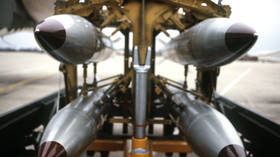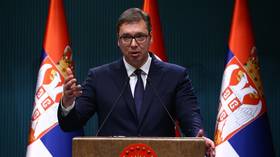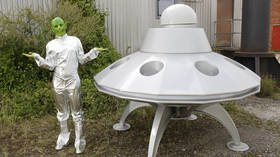POLAND would gladly host American nukes if Germany refuses, US envoy claims, fanning ‘Cuban missile crisis 2.0’

As the US ambassador to Germany – and acting spy chief – tried persuading Berlin to keep hosting US nuclear weapons, his colleague in Warsaw suggested Poland would be willing to take them instead, an act sure to provoke Moscow.
“If Germany wants to diminish nuclear capability and weaken NATO, perhaps Poland – which pays its fair share, understands the risks, and is on NATO's eastern flank – could house the capabilities here,” Ambassador Georgette Mosbacher tweeted on Friday.
If Germany wants to diminish nuclear capability and weaken NATO, perhaps Poland - which pays its fair share, understands the risks, and is on NATO's eastern flank - could house the capabilities here: https://t.co/VIzpHIgoUN
— Georgette Mosbacher (@USAmbPoland) May 15, 2020
She was commenting on the statement by Rick Grenell, the US ambassador to Germany who is also the acting director of National Intelligence, issued on Thursday, urging the authorities in Berlin not to weaken NATO by seeking the removal of US nuclear weapons from their soil.
“The purpose of NATO’s nuclear share is to keep non-nuclear member states involved in the planning of NATO’s deterrence policy. Germany’s participation in nuclear share ensures that its voice matters,” Grenell wrote. “Will Germany bear this responsibility, or will it sit back and simply enjoy the economic benefits of security provided by its other allies?”
Also on rt.com ‘If Trump launched nukes, could we stop him?’ Germany’s SPD clashes with coalition allies over NATO nuclear sharingWhile Mosbacher’s quip may have been nothing more than an attempt to bolster Grenell’s argument, her replies were flooded by Poles eager for the nuclear redeployment to happen – albeit none of them representing official Warsaw, just yet.
Only a few voices cautioned against the idea, such as former US Marine and weapons inspector Scott Ritter telling Mosbacher she had “no sense of history” and calling her idea “one of the dumbest” in the world.
You have no sense of history, do you. Simply one of the dumbest ideas in the world. By the way, the Russian Hogh Command thanks you for making it easier to overrun and seize this so-called nuclear deterrent. Google 1st Guards Tank Army.
— Scott Ritter (@RealScottRitter) May 15, 2020
Mosbacher also made headlines in Moscow, where it was noted that moving the bombs to Poland would destroy the final vestiges of the Russia-NATO Founding Act, the 1997 treaty which declares that “NATO and Russia do not consider each other as adversaries.”
Admittedly, this sentiment has been repeatedly rejected by NATO itself, from the 1999 war against Yugoslavia intended to send Russia a message, to this week’s editorial by the alliance’s Secretary-General Jens Stoltenberg, citing “Russian aggression” to urge Berlin to keep US nukes.
Our goal is a world without nuclear weapons, but as long as these weapons exist, #NATO’s nuclear deterrent remains essential to protect peace & freedom. Read my commentary from @faznet: https://t.co/zu5UvJH2y4
— Jens Stoltenberg (@jensstoltenberg) May 11, 2020
This is not the first time that Mosbacher – a former cosmetics executive who entered diplomacy during the Obama administration and was sent to Warsaw by President Donald Trump in 2018 – has made headlines in Moscow. Back in January, she endorsed the Polish revision of WWII history that claimed Nazi Germany and the Soviet Union “colluded” to start the war by invading Poland.
While it is unclear whether her tweet is an official State Department position, it would not be entirely out of line with the Trump administration’s aspirations to station US troops in Poland permanently, while dismantling nuclear treaties with Russia.
Also on rt.com Pity they don’t work against Covid-19: US drives RECORD global spending on atomic weapons, report showsLast year, the US shredded the 1987 INF arms control treaty in Europe, and seems to be on track not to renew the last remaining nuclear pact with Moscow, the 2011 New Start, scheduled to expire next February.
If the US moves nuclear warheads to Poland, this could result in a rerun of the 1962 Cuban Missile Crisis, when the Soviet Union reacted to US nuclear deployments in Turkey by sending its own missiles to Cuba. After a standoff that almost escalated into nuclear war, both Washington and Moscow stood down and pledged to withdraw their missiles.
Georgette Mosbacher's observations follow talk in Germany's governing (in coalition with the CDU) SPD of asking Washington to remove its nukes from German soil. Any US deployment of nuclear weapons in Poland would be a *major* violation of the 1997 Russia-NATO Founding Act.
— Bryan MacDonald (@27khv) May 15, 2020
Think your friends would be interested? Share this story!













